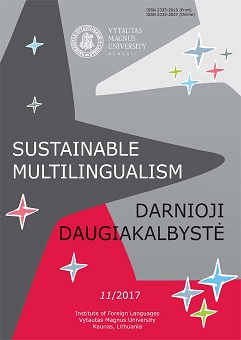CLIL mokytojų kompetencijos ir požiūris
CLIL Teacher Competences and Attitudes
Author(s): Lilija Vilkancienė, Inga RozgienėSubject(s): Education, Foreign languages learning, Language acquisition, Pragmatics
Published by: Vytauto Didžiojo Universitetas
Keywords: CLIL; professional competences; languages;
Summary/Abstract: The paper presents the findings of the research carried out among the participants of the project ”Development of Content and Language Integrated Learning (CLIL) in Education” (2011-2013) that aimed to upgrade the competences of subject teachers enabling them to implement content and foreign language integrated learning approach in general education and vocational training. The data obtained through a survey indicates that the project participants developed a positive attitude towards the CLIL approach and positively assess the competences acquired during the programme. European Framework for CLIL Teacher Education proves to be a useful tool when designing training courses for specific target groups of qualified content teachers and a fifty hours' programme seems to be adequate to get acquainted with the fundamentals of CLIL. The project participants were most positive about their CLIL methodology competence development during the project and ability to identify appropriate subject content for teaching by using the CLIL approach. The weakest point identified by the participants involves language-related issues, such as ability to support language learning in content, balancing the target language used between the learners' and teacher's linguistic ability, and overall insufficiency of linguistic competences. One more issue indicated by the respondents is the absence of standards, guidance and administrative support, as well as quality assurance (content delivery, materials and assessment) in CLIL.
Journal: Darnioji daugiakalbystė
- Issue Year: 2017
- Issue No: 11
- Page Range: 196-218
- Page Count: 23
- Language: English

